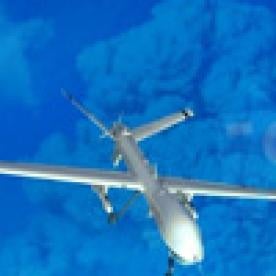Imagine you’re hiking a long, secluded stretch of the Pacific Crest Trail. You’ve become dehydrated and disoriented. You’re lost, thirsty, hungry, bewildered and the next water source is ten miles away. What do you do? Lay in the dirt and hope for rain? Soon, you may be able to click a button on your phone and a Google emergency medical response drone will be dispatched to your very coordinates with an entire care package suited to your particular distress. In this case it might be water bottles, dry goods, a map, water purifiers, etc. But, in another situation, the package may include oxygen, a defibrillator, an Epipen®, you name it. Google’s recently obtained patent on providing emergency medical services via drones is definitely raising eyebrows.
While Google has an astounding list of patents on a wide variety of interesting and innovative unmanned technology (think self-driving vehicles, automatically-regulated home thermostats, self-compiled sports highlight footage), its patent for emergency medical response drones has definitely stepped into the spotlight. In response to many inquiries about the new technology, Google has stated time and again that it owns patents on a wide variety of ideas, some of which later turn into real products and services and some that do not. However, prospective product announcements, according to Google, should not be inferred from its patent applications. Which is true and also savvy. Just because Google obtains the patent doesn’t mean the envisioned product will actually come to fruition. But isn’t it an exciting thought?
Google wants to save your life. They have an entire fleet of drones just waiting to be dispatched to injured passengers in a car accident, divers suffering from the bends, heart attack victims, children in anaphylactic shock, and so on.
It starts to look like a trailer for a sci-fi movie: I, Drone, but it could be a reality. The most complicated technology behind Google’s patent is the determination of the particular medical emergency and dispatch of the appropriately equipped EMS drone. Once this hurdle is overcome, however, the possibilities seem endless: an immediate, reliable, no-risk responder to almost every foreseeable emergency. Imagine the use of drones in response to a natural disaster. What if this technology had been in place in the wake of Hurricane Katrina?
The reasoning behind Google’s decision to limit its patent exclusively to providing medical services has sparked some debate. Even assuming Google does proceed with product development for emergency medical response drones, it still faces many regulatory hurdles from the Federal Aviation Administration in ensuring its EMS drones can access any victim, anywhere. Currently, under FAA regulations, a drone can only be flown in the United States if it is within the pilot’s line of sight. That certainly limits Google’s emergency medical response range. But some speculate Google’s intent in obtaining a patent designed purely to save lives may work as an impetus to loosen the FAA regulations on intranational drone use over time. It is no secret that larger retail companies have been contemplating drone use for delivery of products. Amazon has been testing what it calls Amazon Prime Air, which would involve using drones to deliver goods to online retail customers. Again, sci-fi images emerge. A scene like the Jetsons, with drones delivering your morning coffee, seems a possible reality. The delivery of goods by drone may have come across as too invasive. But, if one company can wiggle into that space by offering emergency medical equipment first, perhaps the gap could widen. If you’ll let Google drop off a first aid kit, do you mind if they bring that new Fitbit you ordered while they’re at it?
Google’s EMS drone patent is undeniably intriguing. It makes us think about the litigation that might ensue with competing EMS drone patents, a potential monopoly on the emergency response drone market and liability over failed drone rescue attempts. Many varied experts will be needed to prove or defend such claims and we’re cultivating relationships early. We want to hear from you. What do you see as the future of litigation regarding this potential new offering?




 i
i


